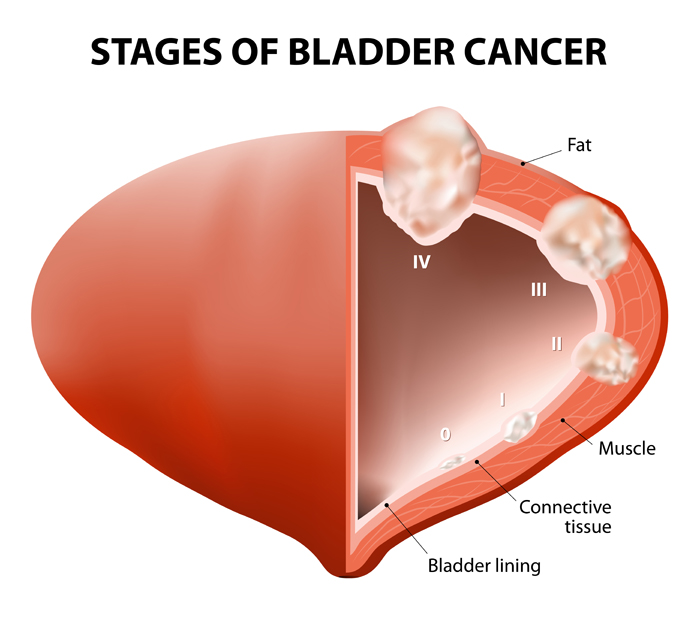Best Bladder Cancer Treatment & Diagnostics in C Scheme, Jaipur
The bladder is a hollow muscular tissue in your lower abdomen that stores urine. Bladder cancer is a kind of cancer that starts in the bladder's cells and usually begins in the cells that line the interior of your bladder (urothelial cells). The majority of bladder cancers are detected early on when they can be cured.
What Are Causes of Bladder cancer?
Bladder cancer develops when the DNA of cells in the bladder changes (mutates). The DNA of a cell includes instructions that tell it what to do. The modifications instruct the cell to proliferate quickly and continue to live even when healthy cells would perish. The aberrant cells create a tumour, which can infiltrate and kill healthy tissue. The aberrant cells might eventually break free and spread throughout the body (metastasize).

What Are the Symptoms of Bladder cancer?
Fatigue, weight loss, and bone soreness are some of the symptoms that might suggest bladder cancer, and they can signify a more advanced illness. Blood can be seen in the urine of many patients with bladder cancer, although they do not experience pain when peeing. Pay special attention to the following signs and symptoms:
- painful urination
- blood in the urine
- urgent urination
- pain in the lower back
- frequent urination
- pain in the abdominal area
- urinary incontinence
When to See a Doctor at Apollo Spectra, Jaipur?
Make an appointment with your doctor to get your urine tested if you detect darker pee and are afraid it may contain blood. If you have any additional signs or symptoms that concern you, arrange an appointment with your doctor in Jaipur.
Request an appointment at Apollo Spectra Hospitals, Jaipur
Call 1860 500 2244 to book an appointment.
How Is Bladder Cancer Diagnosed?
One or more of the following approaches may be used by your doctor to diagnose bladder cancer:
- Urinalysis, an examination in which your doctor uses gloved fingers to feel for lumps that might signal a malignant development in your vaginal or rectum.
- Cystoscopy, in which your doctor inserts a thin tube with a small camera into your urethra to view inside your bladder;
- Biopsy, in which your doctor inserts a small instrument into your urethra and removes a small sample of tissue from your bladder to screen for cancer.
- Computed tomography (CT) scan of the bladder
- Pyelogram administered intravenously (IVP)
- X-rays
How Can We Treat Bladder cancer?
Based on the kind and stage of your bladder cancer, your symptoms, and your general health, the specialists at Apollo Specta, Jaipur will work with you to choose the best treatment option.
Treatment options for stage 0 and stage 1 cancers
Surgery to remove the tumour from the bladder, chemotherapy, or immunotherapy may be used to treat stage 0 and stage 1 bladder cancer.
Stages 2 and 3 of the disease are treated differently.
Treatment options for bladder cancer in stages 2 and 3 includes:
In addition to chemotherapy, a portion of the bladder is removed.
A radical cystectomy involves the removal of the whole bladder, followed by surgery to establish a new route for urine to escape the body.
Treatment for bladder cancer at stage 4
Treatment options for bladder cancer at stage 4 include:
Chemotherapy without surgery to ease symptoms and prolong life radical cystectomy and lymph node removal, followed by surgery to construct a new route for urine to escape the body.
Conclusion
Bladder cancer is defined as the uncontrolled abnormal development and multiplication of cells in the urinary bladder that have escaped the usual processes that keep uncontrolled cell proliferation in check. Invasive bladder cancer, like tumors of other organs, can spread (metastasize) to other areas of the body, such as the lungs, bones, and liver.
Bladder cancer typically begins in the bladder's innermost layer (for example, the mucosa) and spreads to the deeper layers as it progresses. It might also be limited to the mucosa for an extended length of time. It can take on a variety of visual shapes.
There are several bladder cancer data available, including who is most often diagnosed, at what stage it is most commonly discovered, survival rates, and much more. Bladder cancer affects more than 90 percent of persons over the age of 55, with an average age of 73.
One thing to keep in mind with bladder cancer therapy is that, because it is commonly diagnosed in its early stages, there are typically numerous alternatives accessible. Second, surgery is the most frequent treatment for bladder cancer.
The symptoms of bladder cancer in both men and women are typically the same. The most common sign, however, is blood in the urine, which is frequently mistaken for menstruation by women and so goes unnoticed. Bladder cancer is frequently identified earlier in males than in women because men are more likely to notice blood in their urine.


.svg)
.svg)
.svg)
.svg)









